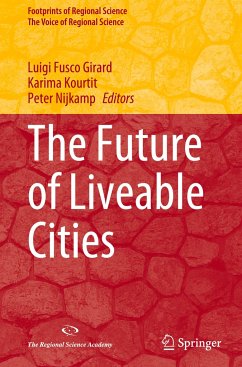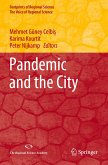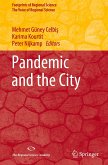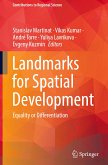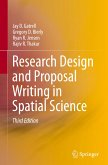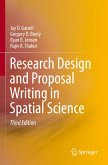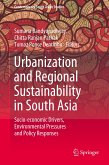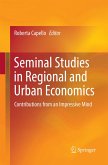The Future of Liveable Cities
Herausgegeben:Fusco Girard, Luigi; Kourtit, Karima; Nijkamp, Peter
The Future of Liveable Cities
Herausgegeben:Fusco Girard, Luigi; Kourtit, Karima; Nijkamp, Peter
- Gebundenes Buch
- Merkliste
- Auf die Merkliste
- Bewerten Bewerten
- Teilen
- Produkt teilen
- Produkterinnerung
- Produkterinnerung
This book explores the concept of livable cities, where people enjoy living and being, and examines indicators of citizens' well-being in relation to the urban environment. It is authored by experts from diverse disciplines, providing a citizen-centered perspective on urban well-being in sustainable, environmentally friendly, and climate-neutral (or -positive) cities. The contributions focus on the human and social aspects of cities, developing operational models and frameworks for circular cities, smart resource utilization, and examining contextual factors such as environmental and…mehr
Andere Kunden interessierten sich auch für
![Pandemic and the City Pandemic and the City]() Pandemic and the City110,99 €
Pandemic and the City110,99 €![Pandemic and the City Pandemic and the City]() Pandemic and the City110,99 €
Pandemic and the City110,99 €![Landmarks for Spatial Development Landmarks for Spatial Development]() Landmarks for Spatial Development103,99 €
Landmarks for Spatial Development103,99 €![Research Design and Proposal Writing in Spatial Science Research Design and Proposal Writing in Spatial Science]() Jay D. GatrellResearch Design and Proposal Writing in Spatial Science88,99 €
Jay D. GatrellResearch Design and Proposal Writing in Spatial Science88,99 €![Research Design and Proposal Writing in Spatial Science Research Design and Proposal Writing in Spatial Science]() Jay D. GatrellResearch Design and Proposal Writing in Spatial Science88,99 €
Jay D. GatrellResearch Design and Proposal Writing in Spatial Science88,99 €![Urbanization and Regional Sustainability in South Asia Urbanization and Regional Sustainability in South Asia]() Urbanization and Regional Sustainability in South Asia74,99 €
Urbanization and Regional Sustainability in South Asia74,99 €![Seminal Studies in Regional and Urban Economics Seminal Studies in Regional and Urban Economics]() Seminal Studies in Regional and Urban Economics74,99 €
Seminal Studies in Regional and Urban Economics74,99 €-
-
-
This book explores the concept of livable cities, where people enjoy living and being, and examines indicators of citizens' well-being in relation to the urban environment. It is authored by experts from diverse disciplines, providing a citizen-centered perspective on urban well-being in sustainable, environmentally friendly, and climate-neutral (or -positive) cities. The contributions focus on the human and social aspects of cities, developing operational models and frameworks for circular cities, smart resource utilization, and examining contextual factors such as environmental and neighborhood quality, energy transition, climate neutrality, and recycling as factors that influence the well-being of "homo urbanus." The chapters approach these topics from various analytical perspectives, including conceptual/theoretical, methodological/modeling, policy/planning, and evidence-based case studies. This book will be of interest to scholars in regional and spatial science, urban geography, economics, and related fields, as well as those interested in urban well-being.
Produktdetails
- Produktdetails
- Footprints of Regional Science
- Verlag: Springer / Springer International Publishing / Springer, Berlin
- Artikelnr. des Verlages: 978-3-031-37465-4
- 1st ed. 2023
- Seitenzahl: 344
- Erscheinungstermin: 20. Dezember 2023
- Englisch
- Abmessung: 241mm x 160mm x 25mm
- Gewicht: 682g
- ISBN-13: 9783031374654
- ISBN-10: 3031374657
- Artikelnr.: 68162269
- Footprints of Regional Science
- Verlag: Springer / Springer International Publishing / Springer, Berlin
- Artikelnr. des Verlages: 978-3-031-37465-4
- 1st ed. 2023
- Seitenzahl: 344
- Erscheinungstermin: 20. Dezember 2023
- Englisch
- Abmessung: 241mm x 160mm x 25mm
- Gewicht: 682g
- ISBN-13: 9783031374654
- ISBN-10: 3031374657
- Artikelnr.: 68162269
¿Luigi Fusco Girard is an emeritus professor at University Federico II of Naples, Italy. He is associate at National Council of Research (CNR- IRISS) and the Scientific Coordinator of the Horizon 2020 CLIC project (www.clicproject.eu) on innovative business, financing and governance models for the adaptive reuse of cultural heritage in the perspective of the circular economy and circular city model. As ISCEC-ICOMOS President, he has participated at the Stakeholders' Committee meetings for the European Year of Cultural Heritage 2018, contributing with inspirational and scientific papers on the role of cultural heritage as "connective" infrastructure of European cities and regions. He is the Director of International Laboratory on Creative and Sustainable City that has been recognized by UN-Habitat (from 2011) and UN-Habitat Universities (from 2015) as coordinator of Universities Research Hub on Urban Regeneration. Karima Kourtit isa researcher at the Open University, Heerlen, The Netherlands. She was lab-owner at the Jheronimus Academy of Data Science (JADS) in the division Smart Cities & Data Analytics (owned by the Eindhoven University of Technology and Tilburg University), 's-Hertogenbosch, The Netherlands. She has worked in the Department of Urban Planning and Environment at the Center for the Future of Places (CFP), at the School of Architecture and Built Environment at KTH Royal Institute of Technology, Stockholm, and at Adam Mickiewicz University, Poznan, Poland. She holds two Ph.D.s, in both economics and geography (with distinction), and has a particular interest in regional and urban topics. Her research focuses on the emerging 'New Urban World'. She has also been involved in the implementation of several national and international research projects and initiatives. Furthermore, she has been an editor of several books and guest editor for various international journals, and has published a wide array of scientific articles, papers, special issues of journals and edited volumes in the field of geography and the spatial sciences. She is also managing director of The Regional Science Academy. In summary, her academic profile is characterized by a deep involvement in evidence-based urban and spatial research on smart city policy and data metrics and by a strong commitment to educational support for young researchers. She also participates in numerous international scientific and managerial activities. Peter Nijkamp is an emeritus professor of regional and urban economics and of economic geography at the VU University, and is also associated with The Open University of the Netherlands (OU), Heerlen (The Netherlands); Alexandru Ioan Cuza University of Iasi, Iasi (Romania); KTH Royal Institute of Technology, Stockholm (Sweden), the University of Technology, Benguérir (Morocco) and A. Mickiewicz University, Poznan (Poland). He serves on the editorial/advisory boards of more than 30 journals. According to the RePec list, he is one of the top 30 best-known economists in the world. He is also a fellow and former vice-president of the Royal Netherlands Academy of Sciences. He has served as president of the governing board of the Netherlands Research Council (NWO). In 1996, he was awarded the most prestigious scientific prize in the Netherlands, the Spinoza award. He is co-editor of the Handbook of Regional Science published by Springer.
Chapter 1. Challenges for a Liveable Urban World (Luigi Fusco Girard).- Part I. Spotlights on Liveable Cities.- Chapter 2. Livable Cities: A Conceptual Modelling Approach (Dani Broitman).- Chapter 3. Defining Indicator Systems for Liveable Cities (Rudolf Giffinger).- Chapter 4. Three Conditions for Liveable Cities: Geographical Inclusion, Carbon Neutrality and Transport Innovation (Nicos Komninos).- Chapter 5. ICT Solutions for Smart Urban Mobility: A Review (Luca Zamparini).- Chapter 6. Adapting Historic Cities Towards the Circular Economy: Technologies and Materials for Circular Adaptive Reuse of Historic Buildings (Mariarosaria Angrisano).- Part II. Urban Liveability Planning.- Chapter 7. Green Liveable Urban Futures: the Integration of Nature-Based Solutions into Planning as a Strategy for Regreening the Post-Oil City (Steffen Lehmann).- Chapter 8. The Impact of Spatially Egalitarian Functional Urban Areas. The Case of Lisbon Metropolitan Region (Tomaz Ponce Dentinho).- Chapter 9. Challenges in Building More Liveable Cities in Post-Socialist European Countries: from "Cities4all" to "Cities4everyone" (Alexandru Banica).- Chapter 10. A Tale of Two Big Cities Struggling for their Agriculture Conflict and Oppositions around Land Farming in the Greater São Paulo and Paris Regions (Brenno Fonseca).- Part III. Urban Quality of Life Challenges.- Chapter 11. After COVID: A Circular Recovery in Western European Cities (Joanna Williams).- Chapter 12. Covid-19 City Perspective: The Impacts on the Real Estate Dynamics (Pasquale De Toro).- Chapter 13. Actors of Urban Health at World and Continental Scales: An Intercontinental Comparison of Urban Health Actions Using Topic Modeling on a Large Worldwide Web Mining (2000-2021) (Céline Rozenblat).- Chapter 14. Same Bed, Different Dreams? Socioeconomic Strata and Differences in Liveability Perception in European Cities (Pui-Hang Wong).
Chapter 1. Challenges for a Liveable Urban World (Luigi Fusco Girard).- Part I. Spotlights on Liveable Cities.- Chapter 2. Livable Cities: A Conceptual Modelling Approach (Dani Broitman).- Chapter 3. Defining Indicator Systems for Liveable Cities (Rudolf Giffinger).- Chapter 4. Three Conditions for Liveable Cities: Geographical Inclusion, Carbon Neutrality and Transport Innovation (Nicos Komninos).- Chapter 5. ICT Solutions for Smart Urban Mobility: A Review (Luca Zamparini).- Chapter 6. Adapting Historic Cities Towards the Circular Economy: Technologies and Materials for Circular Adaptive Reuse of Historic Buildings (Mariarosaria Angrisano).- Part II. Urban Liveability Planning.- Chapter 7. Green Liveable Urban Futures: the Integration of Nature-Based Solutions into Planning as a Strategy for Regreening the Post-Oil City (Steffen Lehmann).- Chapter 8. The Impact of Spatially Egalitarian Functional Urban Areas. The Case of Lisbon Metropolitan Region (Tomaz Ponce Dentinho).- Chapter 9. Challenges in Building More Liveable Cities in Post-Socialist European Countries: from "Cities4all" to "Cities4everyone" (Alexandru Banica).- Chapter 10. A Tale of Two Big Cities Struggling for their Agriculture Conflict and Oppositions around Land Farming in the Greater São Paulo and Paris Regions (Brenno Fonseca).- Part III. Urban Quality of Life Challenges.- Chapter 11. After COVID: A Circular Recovery in Western European Cities (Joanna Williams).- Chapter 12. Covid-19 City Perspective: The Impacts on the Real Estate Dynamics (Pasquale De Toro).- Chapter 13. Actors of Urban Health at World and Continental Scales: An Intercontinental Comparison of Urban Health Actions Using Topic Modeling on a Large Worldwide Web Mining (2000-2021) (Céline Rozenblat).- Chapter 14. Same Bed, Different Dreams? Socioeconomic Strata and Differences in Liveability Perception in European Cities (Pui-Hang Wong).

